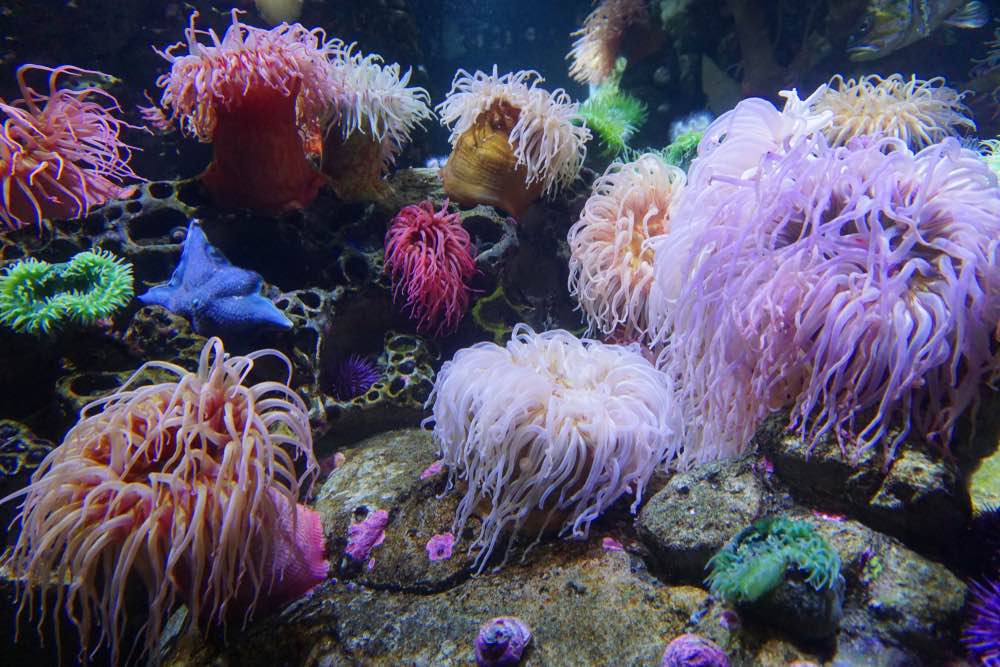10 Great Tank Mates for Oscar Fish (With Pictures)
Updated on
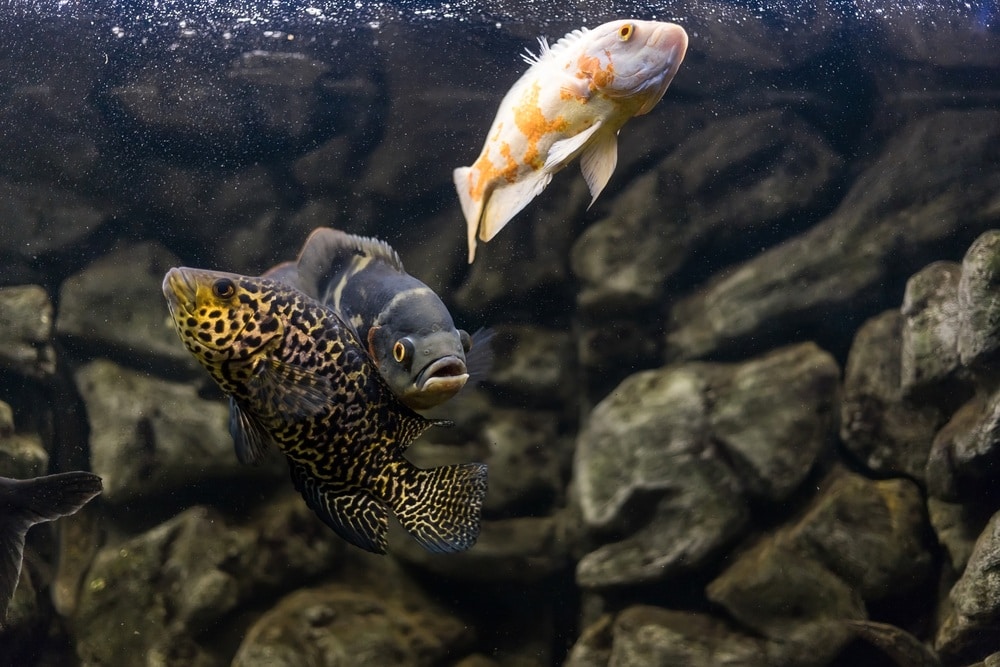
Click to Skip Ahead
Oscars are attractive fish with big attitudes and big appetites, which can make finding tank mates for them a challenge. Fish that are too small or timid may get eaten, but fish that are too aggressive or territorial may lead to fights, injuries, and death. Finding the perfect tank mates for your Oscars is all about finding a delicate balance. Here are some of the best tank mates you can choose for your Oscars.
The 10 Great Tank Mates for Oscar Fish
1. Bichir

| Size: | 1–2.5 feet (30.5–76 cm) |
| Diet: | Carnivore |
| Minimum tank size: | 55 gallon (208 liters) |
| Care Level: | Medium |
| Temperament: | Semi-aggressive |
Although semi-aggressive, Bichirs are large enough to not fall prey to Oscars. They have poor vision and use their other senses to hunt prey. This means that it is unlikely they will mistake an Oscar for a meal and attack it. These fish do get very large, though, so they require a large enough tank that both the Bichir and the Oscar have enough space to hunt and avoid each other.
2. Loricariidae – Most Compatible
| Size: | 3 inches–3 feet (7.6–91.4 cm) |
| Diet: | Omnivores |
| Minimum tank size: | 25 gallons (94.6 liters) |
| Care Level: | Medium |
| Temperament: | Peaceful, shy |
Loricariidae is a family of fish, also sometimes called armored catfish. There are over 600 species of Loricariidae catfish in the world, and there are dozens in the pet trade. This means that you can find a Loricariidae catfish that will suit your Oscar tank. Loricariidae in the pet trade are typically sold under the Plecostomus name, and there are a ton of varieties available.
Choose a Loricariidae that will get somewhat large without outgrowing your tank. Their armored scales will protect them against unprovoked Oscar attacks and their peaceful, shy nature means they are content to stay out of the way.
3. Silver Arowana

| Size: | 2–3 feet (61–91.4 cm) |
| Diet: | Carnivore |
| Minimum tank size: | 200 gallons (757 liters) |
| Care Level: | Hard |
| Temperament: | Semi-aggressive |
Silver Arowanas are an attractive addition to a semi-aggressive tank. They get very large and require extremely large environments to thrive. If you keep a Silver Arowana in an appropriate tank size, there should be no issues between it and your Oscar since they will both have plenty of space to stay out of each other’s way.
These fish are definitely not for beginners, though, and require an experienced fish keeper to keep them healthy and stress-free.
4. Silver Dollar
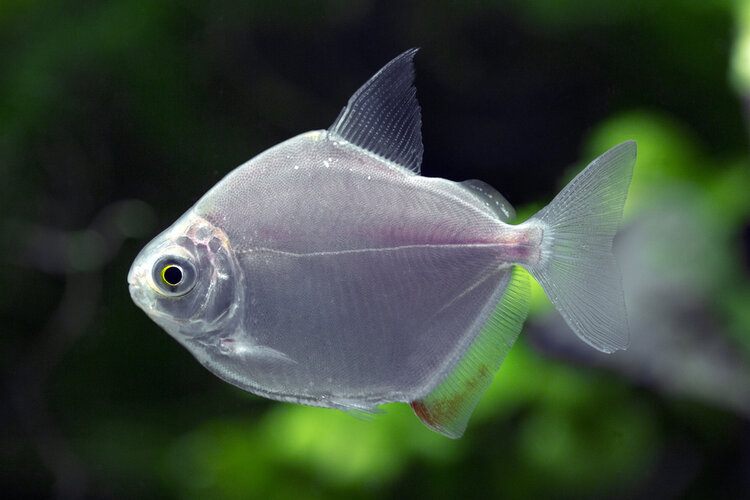
| Size: | (15.2–20.3 cm) |
| Diet: | Omnivores |
| Minimum tank size: | 55 gallons (208 liters) |
| Care Level: | Medium |
| Temperament: | Peaceful |
Silver Dollar fish are large, flat fish that draw a lot of attention to a tank. They are peaceful, but their large size and propensity for shoaling means that they are unlikely to be attacked by Oscars. They are omnivorous, but prefer a mainly herbivorous diet, which means there will be little to no competition between Oscars and Silver Dollars for food.
5. Convict Cichlid
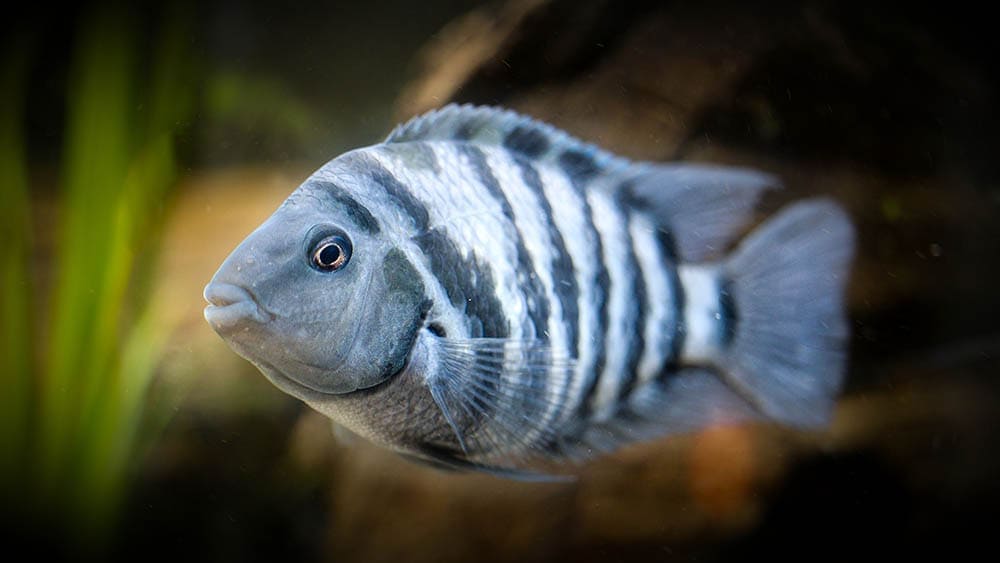
| Size: | 4–6 inches (10–15.2 cm) |
| Diet: | Omnivores |
| Minimum tank size: | 30 gallons (114 liters) |
| Care Level: | Medium |
| Temperament: | Aggressive |
Although aggressive, Convict Cichlids are unlikely to cause problems with your Oscars since Convict Cichlids are significantly smaller than Oscars. They are smaller, but they are not small enough to be eaten by most Oscars. Generally, Oscars and Convict Cichlids will give each other their own space. Make sure your tank is large enough to prevent aggression, though.
6. Firemouth Cichlid
| Size: | 5–6 inches (12.7–15.2 cm) |
| Diet: | Omnivores |
| Minimum tank size: | 30 gallons (114 liters) |
| Care Level: | Easy |
| Temperament: | Semi-aggressive, territorial |
Firemouth Cichlids make great tank mates to Oscars due to their smaller size. They can be kept in pairs or larger groups, but they do become territorial, especially in small spaces. Ensure your Firemouth Cichlids and Oscars have plenty of space to themselves to prevent aggression problems. Firemouth Cichlids are typically too large to be eaten by Oscars.
7. Jack Dempsey Cichlid
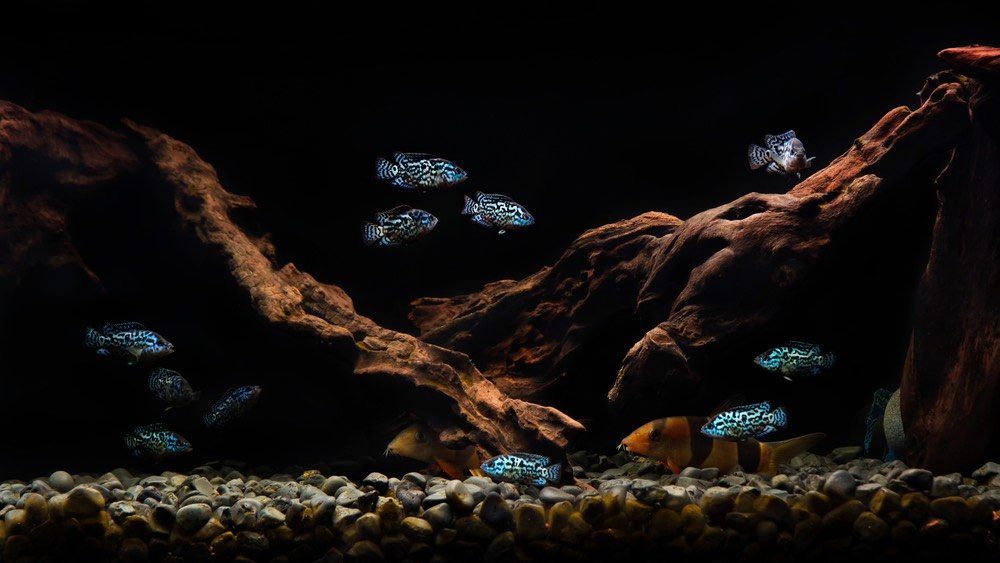
| Size: | 7–10 inches (17.8–25.4 cm) |
| Diet: | Carnivore |
| Minimum tank size: | 55 gallons (208 liters) |
| Care Level: | Medium |
| Temperament: | Territorial |
Jack Dempsey Cichlids are similar in size and temperament to Oscars. In a large environment, both fish will typically leave each other alone. Be aware, though, that both are mainly carnivorous and may compete over food. Provide a large enough space for these large fish to comfortably coexist to avoid aggression and territorial behavior.
8. Tinfoil Barb

| Size: | 8–14 inches (20.3–35.6 cm) |
| Diet: | Omnivore |
| Minimum tank size: | 70 gallons (265 liters) |
| Care Level: | Easy |
| Temperament: | Laid-back |
Tinfoil Barbs are laid-back fish that can happily and safely live in multiple types of community tanks. Don’t be fooled by their relaxed nature, though. These fish can protect themselves if need be, making them great tank mates with Oscars. They are similar in size to Oscars, which means they are likely to be left alone. They are mainly herbivorous and will eat quickly, so ensure your Oscar is getting enough to eat.
9. Black Spotted Eel
| Size: | 20–24 inches (50.8–61 cm) |
| Diet: | Omnivores |
| Minimum tank size: | 75 gallons (284 liters) |
| Care Level: | Medium |
| Temperament: | Peaceful, timid |
The timid Black Spotted Eel is a good tank mate option for your Oscar tank because of its large size and tendency to hide. They tend to be timid and shy, but they get large, which means they are unlikely to become a target of your Oscar. Black Spotted Eels keep to themselves and are content to hide during the day and hunt for small prey and plant matter at night.
10. Jaguar Cichlid
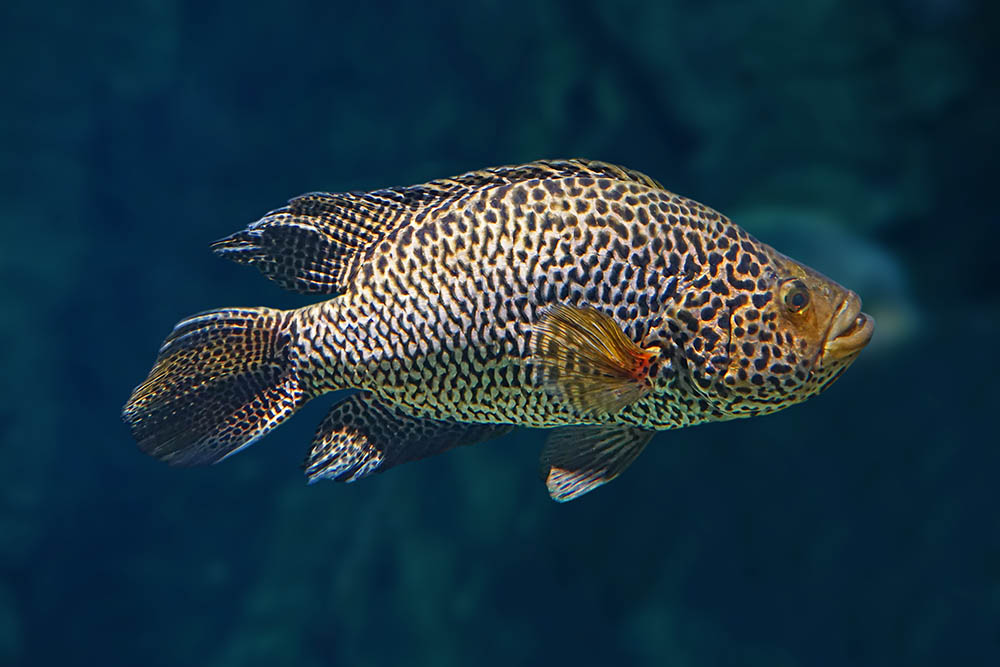
| Size: | 16–24 inches (40.6–61 cm) |
| Diet: | Carnivore |
| Minimum tank size: | 70 gallons (265 liters) |
| Care Level: | Hard |
| Temperament: | Aggressive, territorial |
Jaguar Cichlids are aggressive and territorial Cichlids, but with enough space and their own territory to guard, they can be good tank mates to Oscars. They get larger than most Oscars do, which makes them unlikely to be attacked by your Oscars. If they are well-fed and have plenty of space, they are unlikely to take their aggression out on your Oscar.
What Makes a Good Tank Mate for Oscar Fish?
Oscars are typically passive fish that do not go out of their way to be aggressive. However, they are known to eat smaller tank mates, which makes finding the right tank mates for them difficult. Oscars are unlikely to attack fish that are their size or larger, so other Cichlids are semi-aggressive Cichlids are often considered to be the best tank mate options. Any fish with similar water needs that is capable of defending itself if needed, or is fast enough to escape your Oscar, can make a good tank mate.
Where Do Oscar Fish Prefer to Live in the Aquarium?
Oscar fish are usually found in the middle of the water column, which means that fish that spend time in the upper water column may be safe, but this is not a guarantee. Oscars are known to dive to the bottom of the water column routinely, though. They do this in search of food that may have made its way to the bottom of the tank.
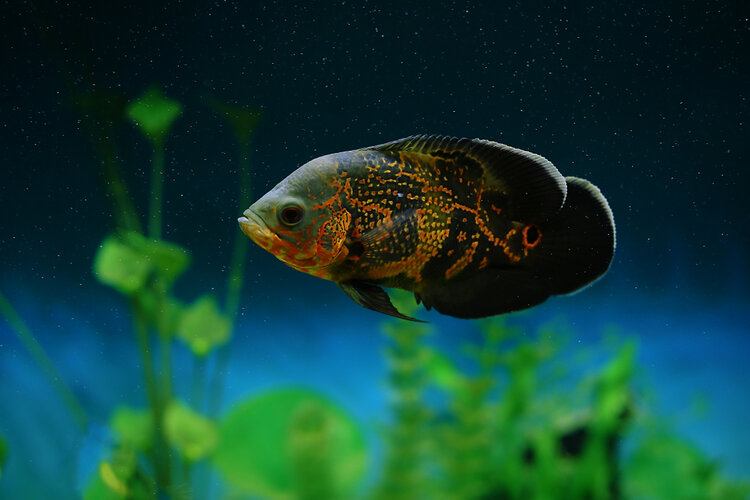
Water Parameters
These South American fish require a tropical freshwater tank setup. They are native to the Amazon and Orinoco Rivers, so they prefer a tank with a moderate to strong water current. Their tropical nature means they require warm water, usually between 74–81˚F (23–27˚C). Ideally, their water should be kept around 77–78˚F (25–25.6˚C). Cool water, even at room temperature, can be deadly for Oscars.
Size
Oscar fish can get quite large, with some reported to have reached 14–18 inches in length. Most Oscars will typically reach 12 inches or less, though. Their large size means they require a large tank. They grow at a moderate rate, sometimes as much as 1 inch per year, so if you purchase a tank for a juvenile Oscar, be prepared to upgrade to a larger tank as it ages.
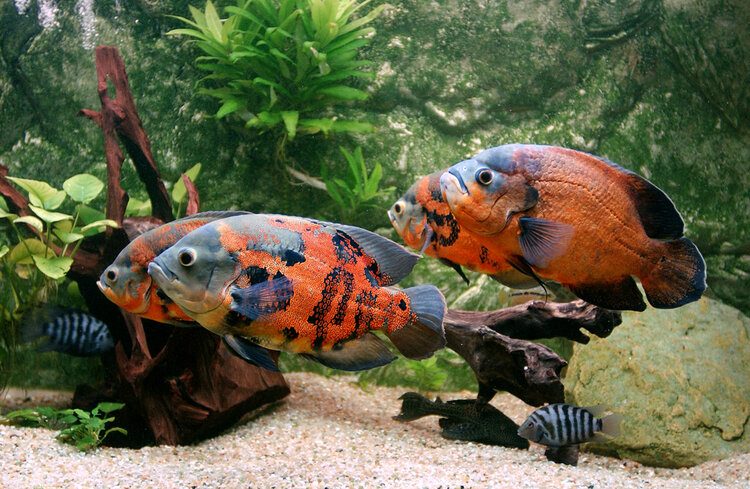
Aggressive Behaviors
Oscars are usually passive fish that keep to themselves in their tank environment. They do develop territories, though, and they will aggressively protect their territory, especially against other Oscars. Their aggression may peak during feeding time, so you may have to offer foods at various points in your tank to ensure all fish get a chance to eat without feeling threatened or like they need to compete for food.
Benefits of Having Tank Mates for Oscar Fish in Your Aquarium
1. Filling the Tank
Since Oscars spend most of their time in the middle of the water column, tank mates that spend time in the upper or lower portions of the water column may help fill your tank without causing any of your fish to feel crowded. Avoid overstocking an Oscar tank, though, as this can lead to territorial and aggressive behaviors.
2. Cleaning the Tank
Oscars can be messy and love to uproot plants and move things around. Tank mates that help keep the tank clean, like Loricariidae catfish, can help clean up some of the mess created by your Oscars.
3. Creating an Aesthetic
Oscars are large, slow-moving fish that create a presence in your tank but don’t bring a lot of activity. Tank mates of different shapes, sizes, and colors, or fast-moving, shoaling fish can all create an aesthetic within your tank that your Oscar fish cannot achieve alone.
Final Thoughts
Choosing tank mates for your Oscar fish can be confusing and risky, but it’s not impossible. Provide a large environment and choose tank mates that will be able to happily live around your Oscars without encroaching on their territory. It is a good idea to check with the seller you are purchasing tank mates from to see what their return policy is, just in case things aren’t working out with your Oscar’s new tank mates.
Provide time for everyone to adjust to a new environment or changed environment. Be aware that new environments and changes can be exceedingly stressful for fish, so you may see an uptick in aggression or unusual behaviors after the addition of new tank mates. Ensure you choose tank mates that are too large to be easily eaten by your Oscar. For example, a Common Plecostomus is far less likely to be eaten by your Oscar than a Clown or Bristlenose Plecostomus.
Featured Image Credit: madcat13shumbrat, Shutterstock




